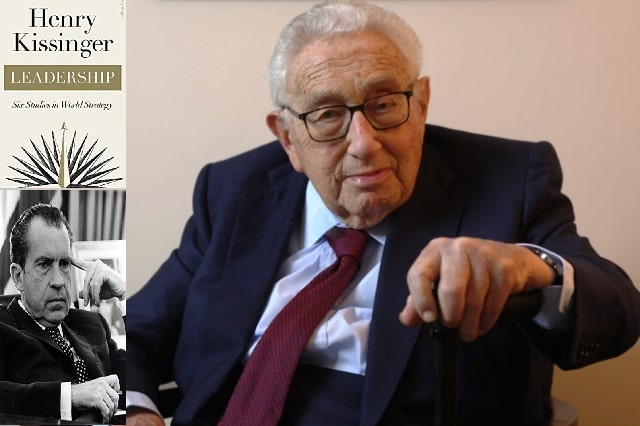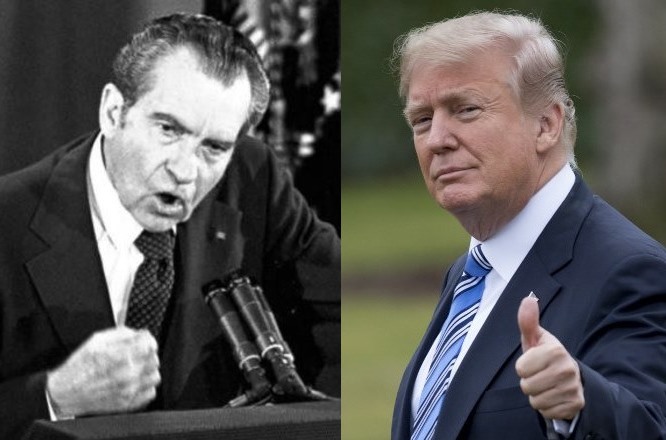The scholar, diplomat and public intellectual that the 99-year old Henry Kissinger is, has unwittingly done himself an injustice by including the disgraced US President Richard Nixon on more than one count in his recently released 528-page tome Leadership: Six Studies in World Strategy. Nixon and Donald Trump will remain engaged in a competition as to who was the worst President in modern history of the United States of America. If featuring Nixon in a select group of world leaders is not a bad judgement in itself, the exacerbation of the scholar diplomat becomes complete by giving the besmirched President under whose charge happened the break-in at the Democratic Party’s National Committee headquarters a lot more space in the book than the other five leaders.
Ahead of his becoming national security adviser to President Nixon in 1969 (followed by many other assignments under Nixon, Gerald Ford and Ronald Reagan), Kissinger graduated summa cum laude from Harvard where he was also a faculty member. Perhaps he didn’t care, but Kissinger has never been liked by liberal Harvard professors and woke students there for his political views.
At the same time, Kissinger will not be unaware that many in the Republican Party agree with the late British author and journalist Christopher Hitchens’ description of Nixon as “duplicitous, gloating, insecure”… and “a small man who claimed to be for the little guy, but was at the service of the fat cats.” But that doesn’t stop him from confirming himself as a hagiographer as he gloats over Nixon’s “wealth of foreign policy experience,”… “his enormous appetite for information”… and his “long view.”
Such is his deference to Nixon – is it because the President’s foreign policy ideas were a mirror image of his own espousal – that Kissinger will staunchly argue to exonerate the President, on occasions going to the extent of putting the blame on his underlings, for all the wrong doings. Let’s take Watergate where the President was found complicit in break-ins in a rival party’s headquarters and all the transgressions that followed. Kissinger would say all these deserved “censure; they did not require removal from office.” Never mind, there would never be a buyer for such arguments.
Using his unique argumentative skills, Kissinger makes attempts in the book and also in a long interview with his biographer Niall Ferguson in Sunday Times to make the President appear like a victim in the Watergate case. You have Kissinger quoting Brycle Harlow, Nixon’s liaison man with Congress, in the book: “Some damn fool got into the Oval Office and did as he was told.” Developing on the point, Kissinger says: “As a general proposition, assistants owe their principals in politics not to be held to emotional statements (about) things you know they wouldn’t do on further reflection.”
Ferguson was given to understand there would be times, in the heat of the moment, or to impress present company, Nixon would give “intemperate verbal orders. But Kissinger learnt quickly not to act every time Nixon ordered him to ‘bomb the hell’ out of someone.” Kissinger’s apologia for shenanigans during Nixon Administration will be no exoneration for the President, for he alone was finally responsible for the doings of his underlings.
ALSO READ: Nixon To Trump – India’s Long Journey
The unravelling of Watergate put paid to the foreign policy ambition of Nixon-Kissinger to bring to an end the conflict in Vietnam on honourable terms, give the Atlantic alliance a new strategic direction, avoid a nuclear conflict with the Soviet Union through arms control policy and highly innovatively bring the US closer to China and Russia than they were to each other. Domestic standing of the national leader will underpin foreign policy success of a government. Ferguson writes that “the Nixon that emerges from Kissinger’s Leadership” is nothing less than a “tragic figure.”
Watergate “destroyed not only his presidency but also doomed South Vietnam to destruction… It was defeat in Vietnam… that set the US on a downward spiral of political polarisation.” At this stage, it will only be pertinent to ask if a President who invited charges of perfidy should find a place in a book on role model national leaders of the last century. More appropriately, as Ferguson asks: “Isn’t he (President Nixon) a case study in how not to lead?”
Whatever that is, there has always been an intense dislike for Nixon in India for his role in the 1971 India-Pakistan war that led to the creation of Bangladesh and all the bad words he mouthed in the presence of Kissinger against prime minister Indira Gandhi, unable to withstand her regal dignity and independence. But to be fair to Kissinger, he wrote about Gandhi long after the Nixon-Gandhi frosty encounter that “Mrs Gandhi was a strong personality relentlessly pursuing India’s national interest with single-mindedness and finesse. I respected her strength even when her policies were hurtful to our national interest.” Why only India, during his Presidency, Nixon courted the wrath of liberals all over the world for his brutish foreign policies in respect of Vietnam, Cambodia, Indonesia and Bangladesh.
The other five global leaders who walked tall in the second half of last century to find places in the book are: Konrad Adenauer, Charles de Gaulle, Anwar Sadat, Lee Kuan Yew and Margaret Thatcher. The world is aware of the heroic role played by Adenauer and de Gaulle in reconstructing Germany and France, respectively, from the Second World War rubbles. Sadat, on his part, performed the task of erasing the humiliation that Egypt suffered in the 1967 Six-Day War with Israel. The mighty city state Singapore is the result of Lee’s vision. The spell that Thatcher cast upon Britain didn’t wear thin even when Tony Blair’s New Labour government was elected in 1997, seven years after Thatcher had to quit rather ingloriously. Both Blair and his successor Gordon Brown hosted Thatcher to tea at 10 Downing Street. In the UK, a former PM could not ask for anything more. It is well known that Kissinger and Thatcher formed a mutual admiration group well before she became PM for the first time in 1979 that ended only at her passing in April 2013.
Kissinger writes: “For Thatcher, there were no sacred cows, much less insurmountable obstacles. Every policy was up for scrutiny. It was not sufficient, she argued, for conservatives to sand down the rough edges of socialism; they had to roll back the state before Britain’s economy collapsed in catastrophic fashion… Thatcher’s economic reforms changed Britain irrevocably.” In his estimate, nothing would confirm Thatcher revolution “more than Blair’s program.” This left Thatcher immensely happy for she told her friend: “I think your analysis is the correct one, but to make one’s political opponent electable and then elected was not quite the strategy I had in mind.” No denying the fact that Thatcher lifted the British economy from morass and gave it an altogether new direction.
At the same time, she gave little space to the opposition and trade unions remained an anathema to her. No wonder intellectuals treading the middle path left of centre across the democratic world never had any love lost for the US’ most gilded diplomat and they will, therefore, have reasons to demur that Kissinger is recommending Thatcher and Lee, who would never tolerate dissent within his own party and outside as role models for the present and future leaders. Democracy prospers in an environment of healthy debate and where people in power will have no hesitation in listening to saner words of the opposition. India’s first prime minister Jawaharlal Nehru would make it a point to be present in Parliament when stalwarts from the opposition would speak. He also loved to host them over a meal.
Kissinger rightly says: “Leaders think and act at the intersection of two axes: the first between the past and the future; the second between the abiding values and aspirations of those they lead. They must balance what they know, which is necessarily drawn from the past, with what they intuit about the future, which is inherently conjectural and uncertain. It is this intuitive grasp and direction that enables leaders to set objectives and lay down strategy.” The tragedy, however, is Kissinger could not drive home this message to President Nixon.

